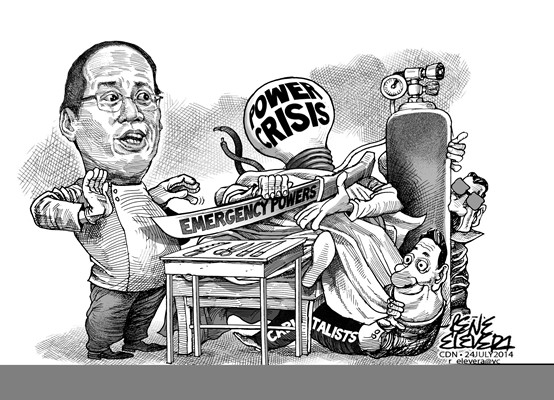The Aquino administration must be feeling all smug and powerful these days, that some of their allies proposed granting him emergency powers to resolve the looming power crisis.
House Speaker Feliciano Belmonte said the Lower House is all too willing to issue emergency powers to President Benigno Aquino III if and when he wants it, provided he spells out what type of emergency power he wants.
Energy Secretary Jericho Petilla recommended emergency powers for President Aquino, who was scheduled to meet with the Department of Energy (DOE) for its recommendations on the looming energy crisis following the projected depletion of the country’s energy reserves on March next year.
This was the same secretary that Sen. Sergio Osmeña III wanted the President to replace for failing to address the energy crisis that beset Mindanao and to meet the self-imposed deadline to restore power in areas hit by supertyphoon Yolanda; the man Osmeña described as a lousy manager.
The immediate danger lies not in President Aquino turning dictatorial and abusing the emergency powers as bandied forth by the militant partylist group Bayan Muna—though we don’t discount that possibility given the President’s stubborn refusal to acknowledge the Supreme Court ruling on the Disbursement Acceleration Program—but in the real likelihood that he will only make things worse.
Consider the energy crisis during the administration of the President’s mother, the late president Corazon Aquino that was inherited by her chosen successor, former president Fidel V. Ramos.
In wanting to jumpstart the country’s energy recovery program, the Congress then granted Ramos emergency powers that allowed him to enter into onerous contracts with independent power producers who got rich and will continue to get rich, providing at best middling to unreliable power supply to millions of Filipino households and businesses.
The Aquino administration has been heavily criticized, and rightly so, for its snail-paced handling of the Yolanda crisis. Filipinos would have to brace for the looming power crisis as best as they can, which means profits for suppliers of generators similar to the ’90s energy crisis.
If news about power plants being prepared in Cebu are true, then the energy crisis may be confined only in Luzon and Mindanao, where there are more aging power plants than new ones.
But Luzon and Mindanao may depend on Cebu and the Visayas to offset their inadequate power reserves, thus dragging the province into the energy crisis as well.
To use an analogy on the proposed energy crisis, why use a sword or even a knife to cut off a cancerous growth in a sick person’s body when a scalpel will do?
Answer: the doctor wielding the scalpel may not be skilled enough to handle it.
So why entrust that doctor with a more dangerous tool?
